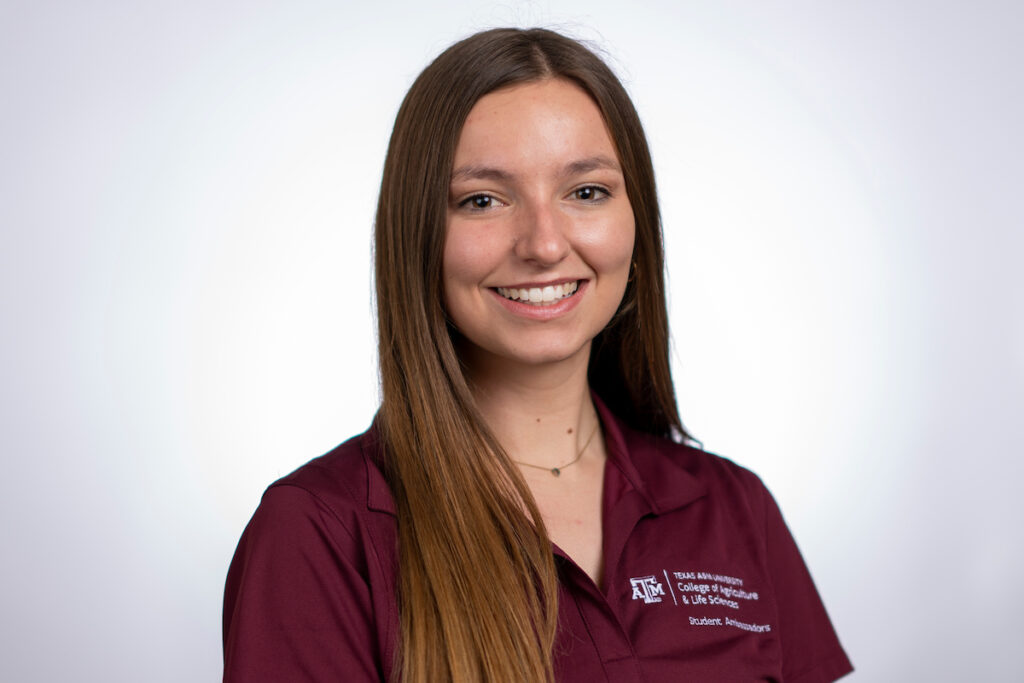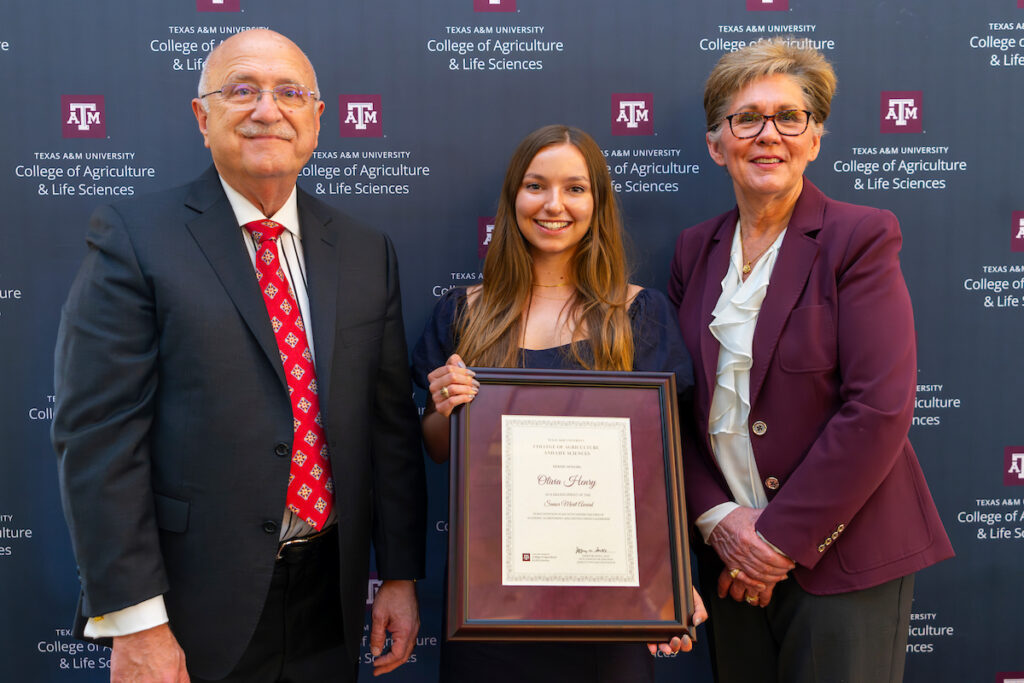At the intersection of science and mystery
Olivia Henry '24 explores a career in the forensic sciences
A childhood love of the Nancy Drew book series helped lead Olivia Henry from a small town in Northern California to College Station to study forensics. Her passion for mysteries, puzzles and problem solving combined with having two parents working in STEM fields nurtured an early interest in the sciences.
During summer breaks from school, she spent “probably half of my time at a little science museum” near her home in Danville. In middle school, she had a science teacher who introduced the class to forensics.

“I thought, this is really cool and kind of a combination of science and problem solving and mysteries,” Henry recalled. “I knew it was perfect for me.”
Henry will graduate in May from the Texas A&M College of Agriculture and Life Sciences Department of Entomology as a forensic and investigative sciences, FIVS, major with a science emphasis and a minor in cybersecurity. She is a University, College and FIVS program honors student.
The first-generation Aggie made sure to make the most of her time at Texas A&M by not only learning to step outside her comfort zone and embracing Aggie traditions but also helping other students as a peer mentor for the Introduction to Academic Success in Forensic and Investigative Sciences and Continuing Academic Success in Forensic and Investigative Sciences classes and the Hullabaloo U Course.
She has also been a College of Agriculture and Life Science Ambassador for three years and has served on the executive cabinet for the Class of 2024 Student Council for the past two years. In addition, she serves on the College’s Student Council, is a Townsend Leadership Fellow, and is a Scholarship for Service recipient.
“There are always open doors in front of you, but you have to walk through them to give yourself the opportunity,” Henry said. “I try to take every opportunity.”
Henry reflected on her time and experiences at Texas A&M.
What initially brought you to Texas A&M?
I decided to come to Texas A&M because they had the No. 1-ranked forensic science program. I, like many students, was also attracted to the spirit of the students and the rich traditions of the school.
Coming from a little town more than 1,500 miles away and going to a state where I knew no one to attend such a huge university felt overwhelming at first. But, within two weeks, I had made so many friends. And although Texas A&M is huge, the College and departments seem smaller as you’ll see the same faces around your classes and building. Texas A&M is unique in that I feel like it really has something for everyone. I think all students can find a home here.

What opportunities has attending Texas A&M provided for you?
I’ve been very blessed with the opportunities. My first internship was working crime scenes, and that came about because a former Aggie from the program reached out hoping to have an Aggie intern. I spent the summer of 2022 interning with Jeremy Arnold ’18 with the Carrollton Police Department Crime Scene Unit.
It was also during that internship that I got to experience the digital side of evidence. I had grown up with a dad in information technology and had sworn up and down that I would never, ever, ever do anything with tech because I thought it was so boring. But when I was exposed to how it is involved in solving crimes, like using an Apple watch on a victim to determine the time of death or dumping phone data for evidence, I added a minor in cybersecurity.
What is one of your favorite memories of attending Texas A&M?
I worked as a student ambassador for the College and one Saturday I met with a prospective student and her mother on campus. The mother asked me question after question, and I was worried when I couldn’t answer all of them, but I spent a lot of time with them and shared my passion and enthusiasm for the College and my major.
Later that day, they came by again and the daughter told me she’d committed to A&M because, by answering their questions and really speaking with them, I’d convinced her and her mom that this was the right place for her to be. That was so exciting to know I had made such an impact on someone and their academic trajectory. I’ve also traveled around with other college students to visit high schools across Texas to talk about being an Aggie. Those will always be some of my favorite memories.
Was there a class or professor that really impacted or influenced your career path?
Dr. Ashleigh Faris is no longer here at Texas A&M, but she was one of those professors who really, really cared about her students and wanted them to succeed. I could call her at any time and she would be there for me. Having a professor like that was super meaningful in my degree because I always knew I had someone in my corner.
Once she left, it was Dr. Craig Coates who kept me on track and helped me finish my capstone. He was instrumental to my success and was always there for me. He also taught one of my favorite courses, Biotechnology and Forensics, which was discussion-based with no power point — which was unlike any class I’d had before.
What are your plans after graduation?
I was fortunate enough to receive an offer from a federal agency, so I will be moving to Washington, D.C., and working there when I graduate. Essentially I will be doing forensics and crime scene investigations at the federal level.
Advice to younger self
I would tell myself you are more capable than you think you are. I would also tell myself to stand firm in who I am and not to doubt myself.
For example, when the first round of applications to be an ambassador came out, I didn’t apply because I didn’t feel I was qualified enough. I thought, they’re not going to want me, I have no ag background. But I ended up getting the ambassador position when they opened the second round of applications – because I actually applied. There’s always an opportunity, but you can’t seize the opportunity if you don’t go out for it.
Advice to future students interested in studying forensics
The broad definition of forensic science to me is the application of scientific principles and methods to assist in criminal investigations and then in a court of law as well. It’s using science and technology – research and the scientific knowledge you have — and then applying that to problems or mysteries you have to figure out. It is really important that you have a complete understanding of all sciences because you never know when you’re going to need chemistry, biology, physics, etc. — all things that can come up at a crime scene.





